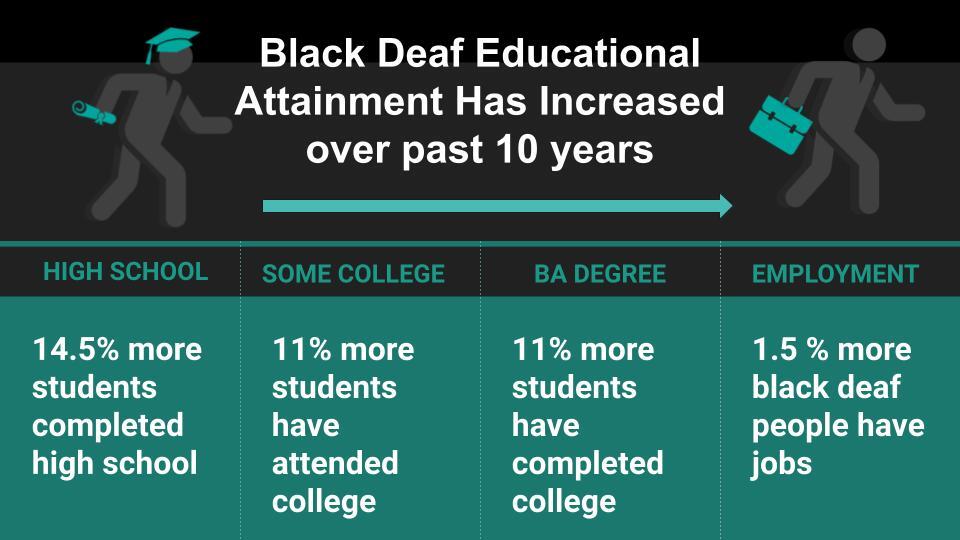In August 2023, NDC attended the National Black Deaf Advocates Conference in Birmingham, Alabama. In partnership with Dr. Lissa Stapleton-Rameriz, this was an opportunity for NDC to connect with the community, spotlight the experience of students who currently attend or who have graduated from a Historically Black College or University (HBCU), and share about initiatives NDC is working on to ensure deaf students have a range of postsecondary options.
Legislation, including the Americans with Disabilities Act and Section 504 of the Rehabilitation Act, has opened a wider range of options for deaf students to pursue postsecondary education and training. It is important that students select an institution that not only fits their academic interests but also takes into consideration all elements of their personhood. For some students, the best choice may be an HBCU. HBCUs have a legacy of serving deaf students, yet these experiences are not widely discussed or documented.
Black Deaf College Student Experiences
A review of data reveals some disparities in college enrollment between black deaf and black hearing students.
Trends over the past 10 years reveal increases in attendance, completion, and employment for Black deaf people.
We recognize that Black deaf students often face a variety of challenges during their educational journeys. Also, we know that ‘mattering’ or lack thereof, can significantly impact their overall well-being and educational outcomes (Powers, 2019).
HBCU Black Deaf Student Panel
HBCUs offer a unique cultural and community-oriented experience that greatly benefits Black deaf students. During the panel discussion, students shared diverse reasons for choosing HBCUs. Some followed family traditions, while others were drawn to the culturally affirming atmosphere, which they believed provided a safe environment for learning. Tarelle Hall shared, “Having other peers who experienced the same struggles and being able to strive through the academic journey, together” was his reason for attending an HBCU. A student who recently graduated from an HBCU expressed that a sense of belonging and connection on campus, the ability to engage in organizations and leadership activities on campus, and the ability to form meaningful connections and friendships were central to their experience.“My self-advocacy has increased at [my college] as I have been part of numerous organizations,” Julia Kennedy shared. The students collectively believed that their presence contributed positively to the college community. They emphasized the importance of learning and sharing the combined
experiences of Black, Deaf, and disabled experiences.
While Black deaf students report overwhelmingly positive experiences and outcomes from attending an HBCU, there are still challenges with awareness and accessibility. “One of my poetry professors had made some negative assumptions about me, and I told her, ‘You will learn to like me and know my name by the end of the semester,’” stated Abiola Haroun. They certainly encountered situations where services were not readily available or did not fit their individual needs. Students noted they learned to be strong self-advocates to ensure they obtained the services they needed to participate fully at the college. Overall, there is a need for more awareness and support for deaf students and students with disabilities at HBCUs.
Strengthening Institutional Readiness
We recognize that college readiness and success is a two-way street. Students must be ready to engage in their learning, uphold their academic responsibilities, and seek support when needed. On the other hand, colleges have a responsibility to fulfill their mission for all students, including providing accessible opportunities, networks, resources, and a supportive environment where students can learn and grow. NDC is committed to supporting HBCUs in their missions and ensuring all students enrolled on their campuses have the opportunity to develop their talents and skills. Over the next few years, NDC will continue to make connections with HBCUs, build networks, and support opportunities that honor deaf student experiences and identities.










